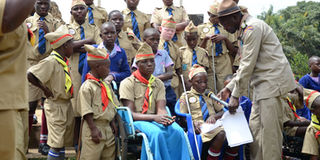Scouting still a relevant aspect of our education

Wilson Kiiza, a visually impaired scout, reads braille. PHOTO | George Katongole
What you need to know:
Children nowadays lead lives that rotate around sitting in class and before the television. They hardly engage in activities that trigger their creativity and enhance skills; that is how scouting comes in. Schools are encouraged to push the scouting agenda because it introduces students skills that are otherwise not taught in schools.
For seven days from August 23 to 29 this year, 4,516 Scouts were camping at Kaazi National Scouts Training and Campsite on the shores of Lake Victoria in Wakiso District.
It is a sight to behold. Grown men, children call trainers, running around in brown shorts with their hairy legs sticking out. Tents, some made out of natural materials springing out.
The 120 acres of land at Kaazi offer a great site where the scouts can enjoy leisure time, let off their steam and splurge their creativity. Besides the beach, there is a ‘Challenge Valley’, a forest in which the scouts have to solve tasks and face different challenges. There is lots of space for accommodation as well as the Campsite which is used for national camps every year. Plenty of houses provide shelter for groups and in addition, Kaazi has large lawn areas to place dozens of tents.
Changing times
Since scouting was introduced to Uganda in 1915 by Rev. Can. H.M Grace at Mbarara High School in Western Uganda, millions of children have embraced the movement.
However, Stephen Butumbwire, the deputy chief commissioner to Gen Edward Katumba Wamala, said over the years, they are struggling to increase enrolment.
“More parents are becoming less interested in the scouting movement,” Butumbwire said.
At the time television shows such as SpongeBob Square Pants, Paw Patrol and Scooby-Doo, among others are experiencing immense popularity coupled with increased awareness of the environment, scouting cannot be spared in terms of enrollment. These are at the heart of scouting which specialises in promoting survival skills and enjoyment of the outdoors as its biggest recruiting tools.
Current enrolment is not known but in 2015, it was estimated that there were approximately two million young scouts from across the country.
While diminishing interest can be attributed to more choices for children —from mushrooming holiday and weekend football academies, music clubs to basketball clinics - and busier academic schedules for children as well as the pressing job demands for parents, scouting remains an important element.
Beneficial
Scouting in Uganda is beneficial considering the high profile people that associate with it. For
But membership that includes President Museveni, the national patron, Prof Maggie Kigozi, Gen Edward Katumba Wamala, Archbishop Livingstone Mpalanyi Nkoyoyo (late), Kyabazinga of Busoga, William Nadiope IV, Susan Anek, the president of the Uganda Netball Federations, former Katikkiro Ham Mukasa and former Ankole Prime Minister Noa Mbaguta, among others, it would be wild to consider it irrelevant.
There are thousands of others that never make it that big but according to Badru Kyewalyanga, a 50-year-old trainer with Good Samaritan Primary School in Mukono, “as long as you are involved, you get something out of it. The skills earned on campouts stay with boys forever.”
He had brought to the camp 12 scouts; nine with disabilities and four helpers. At the school, they have 34 pupils in the Scouts Club. Kyewalyanga, who has 10 years as a trainer said that scouting teaches children universality and adventure.
“From lifesaving skills to being good citizens, Scouts gain a deeper understanding of skills that will affect them for the rest of their lives. And in the case of some skills, like first aid and emergency preparedness, Scouting is a unique opportunity to gain know-how that boys might not get anywhere else,” he said.
He added that a camp is an opportunity to practice what they teach children. “It is a wonderful experience where the disabled Scouts that I brought get recognition, feel loved and some get gifts from others.”
Scouting places a very high value on community involvement and scouts take that commitment very seriously, volunteering for a wide range of projects. Even at schools, they on a daily basis raise and lower the national flag with honour. But spending nights in a camp is an experience no one would want to exchange for anything.
Environmental responsibility plays a large role in the programme’s curriculum and campsite locations are left in the same situation as they found them, under “Leave No Trace” camping rules. Camping, especially for urban youth, is a rarity. Scouting therefore provides a conduit for getting boys away from couches, PlayStation, television and computers into the outdoors. With all the technology surrounding today’s children, it’s not difficult to imagine a childhood where the outdoors plays a substantially reduced role. Yet, Scouting has walks, cooking over an open fire, and survival skills.
The argument can be made that these skills are not necessarily important on a daily basis, but because they are not taught anywhere else, it makes the programme more relevant than ever.
Ten-year-old Manuela Agun, a Primary Four Pupil of Mother Majeri in Bweyogerere, was camping for the first time. She says her dreams of becoming a doctor in the army were given a fresh dimension. “I learnt skills that I feel can be important for me when I grow up. Although I play volleyball, netball and tennis at school, I never missed any of those activities. Not even my parents,” she said, adding that she enjoyed the parade most.
Scouting provides an ideal opportunity for children to step away from their daily routine and not only learn core scouting skills like orienteering, cooking or first aid, but also skills outside the scouting curriculum, like negotiating the pitfalls of adolescence and growing up.
These are realities that children can learn elsewhere, but scouting provides a platform where interaction with teenagers, an occurrence that is sometimes difficult for many families to do at home, can happen.
Then, there are the 12 Scouting’s values that both brand and identify a Boy Scout as clean, good doers: trustworthy, loyal, helpful, friendly, courteous, kind, obedient, cheerful, frugal, brave, clean and reverent. “These are things that most of us want to see in our family, friends and neighbours,” Kyewalyanga, a former journalist, said.
The nuggets of wisdom Baden-Powell was offering when he started out in 1908 could surely offer some pearls of wisdom to children, even today.
Costs
There are costs involved. To make it to the national camp in Kaazi, one needs to be a member of a Scouting Club at the school where they pay membership of Shs3,000 with a card costing Shs10,000. On top of that there needs to be transport to Kaazi as well as feeding. For one to access Kaazi, each child parts with Shs10,000 entrance fees.
“This is not a lot of money given the circumstances,” Bitumbwire said. “The money facilitates a child’s stay and enables them to enjoy to the fullest by embracing the environment they live in.”
Highest award
The top rank in scouting is Eagle Scout —an accomplishment that caps years of work, progressive leadership responsibilities, civic awareness, community volunteerism, dozens of merit badges based on learning specialised skills and countless nights spent camping in forests and wilderness.
It is a long road and a difficult one, but - if a scout sticks with it and accomplishes his goal - the reward is great. It means he has been tested and challenged in a way that not only gives him a greater understanding of his place in his community, but a better understanding of who he is and what he is capable of achieving.




